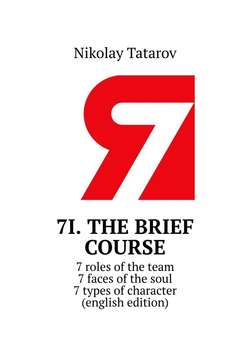Читать книгу 7I. The brief course. 7 roles of the team. 7 faces of the soul. 7 types of character (english edition) - Николай Татаров - Страница 8
§1. FAMILY
7 ROLES – 7 TYPES OF THE CHARACTER
Оглавление7 roles generate 7 types of character (7 psycho types). It happens like this. Having received a role in the team, a person gradually gets used to it and the role becomes familiar to him. Staying on the role does not pass without a trace. Together with the role, a person receives and a set of feelings connected with it, which begin to manifest in the tone of speech, in gestures, facial expressions and poses. Gradually they are getting fixed in manners and habits, and, in the end, become the features of his character. So the role becomes the dominant of the character of a person. The proverb: “Sow an act – reap a habit, sow a habit – reap a character…’, describes the process of transforming of the taken role into the dominant of the character.
Example.
It happens that the person has got the role of an Idol in the team. It means that all treat him with a honour, respect, awe. If the role of an Idol is acceptable to this person, then, being on this role, he does not feel emotional discomfort. Over time, having got used to the role, the one, as it is peculiar to an Idol, begins to look down at others, with a sense of superiority. The role of an Idol is fixed in features of the character. A person becomes arrogant, haughty, assumptive. He develops aristocratic manners. And he behaves like an Idol not only in the team where he was assigned the role of an Idol, but also among other people. He already can not and does not want to behave in another way. It means that the role of an Idol became a dominant of his character, became his basic I, became the essence of his soul. Such person will try to occupy a role of an Idol in any team. What if the role of an Idol is occupied by someone else? If there is already the Idol with all his dignity? They begin the fight for the role of an Idol in the team. They can’t stand each other. They have role conflicts and showdown. Everything will end when one of them will either leave the team, or will stop to apply for a role of an Idol – “will break off his hubris”.
There is a connection between the character formation of the person and the features of his body. For example, a good-natured joker is always describing fat, a cunning person with a long nose, and a smart guy with glasses. Speaking about the strong man, it is necessary to emphasize his simplicity, they will say: “Brains are not needed when you have power”. But the clearest connection of character with the features of the body is reflected in the word “grabber” and derivatives of it: “selfishness”, “selfish habits”, “self-interests”. The word “grabber” – although it is connected with fell (skin), but speaks about quite certain features of the character.
The connection between the body and the soul is not fixed. Not all idols are fat. Not all cunning people have a long nose. Not all clever people have weak eyesight. Not all athletes are simpletons. Not all grabbers have a sensitive fell (skin), etc. But all the same, the connection between the body and the soul exists.
Observed by people, and, therefore, the really existing connection of the person’s character with the feature of his flesh can be explained in a different way. However, only the fact of the existence of such connection is important for the understanding of the character formation, and its nature (the physiological mechanism) does not matter.
Well, now, at last, about the seven I – about 7 roles and about 7 types of character. Those are 7 colourful, well-recognized characters. Each person easily recognizes in them their relatives and friends and acquaintances, neighbours and colleagues. He recognizes himself, because 7 roles are 7 faces, 7 essences, 7 hypostases of each person.
The story of the roles is conducted according to the scheme: role – feeling – spiritual quality (features of the character) – behaviour (actions). In other words, feeling connected with the role, generates a spiritual quality (a feature of the character), which, in turn, generates actions and behaviour.
